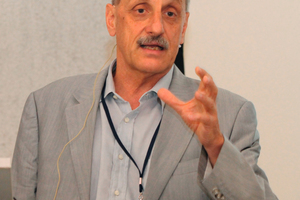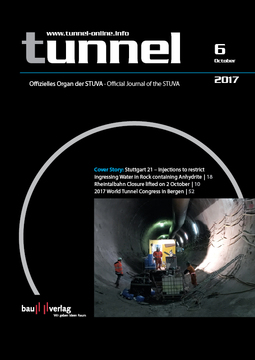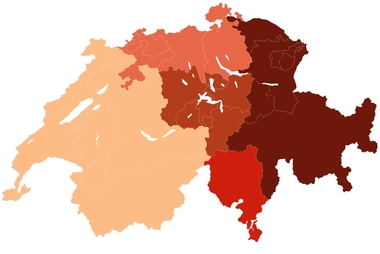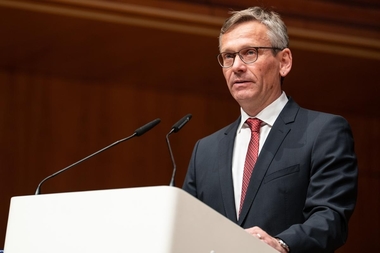SCAUT – Swiss Center of Applied Underground Technologies
When space is scarce in the big cities, construction targets the “third dimension”. This has been the case for quite some time now. Modern high-risers have been featured in urban centres in conurbations since the mid-1800s; the first skyscrapers appeared almost 100 years ago. However, the Swiss SCAUT initiative established just a few months ago is not directed sky high: “The third dimension after all, also leads in the other direction – down below”, as Felix Amberg, the president of the SCAUT development association maintains.
Conceptual Studies and Technology Projects
SCAUT stands for Swiss Center of Applied Underground Technologies. The young industrial initiative, first set up as an Association of Friends, has three main objectives:
1. Provision of professional know-how within the scope of a network to evaluate, conceive and apply future-oriented uses for underground space
2. Promotion of underground-related technology development projects through publications, events and networking platforms
3. International acquisition of innovative underground utilisation concepts as well as supporting projects by establishing and coordinating consortia comprising international and Swiss high-tech companies
Essentially the industrial initiative intends targeting the development and utilisation of underground space through two measures: conceptual studies and technology projects. Within the framework of the conceptual studies, it is intended to analyse ideas for use technologically and economically in terms of their feasibility. SCAUT includes automated goods and passenger transport systems, top security data centres, large-scale storage systems for renewable energies, low-vibration precision plants, low-emission clarification plants or environmentally stable plant farms for agriculture among its examples for innovative uses of underground space.
Furthermore, within the scope of the technology projects, novel and highly promising technological approaches are to be brought to maturity. SCAUT has already initiated a number of development projects in conjunction with industrial partners. Thus for instance the Elkuch Group in collaboration with SCAUT is developing a prefabricated, operational finished element for the completion of tunnel cross-passages, thus reducing assembly work in the tunnel to a minimum. A further project (industrial partner: Sika) deals with the development of dust-binding agents and devices to reduce the pollution of underground systems. The Internet of Things (IoT) is also targeted by the Center. In conjunction with its industrial partner Swisscom in this case the development of communication systems is advanced, in which all essential components for an underground system (e.g. vehicles, tracks, doors) can exchange status information via internet thus facilitating highly automated sequences. In cooperation with Implenia and Sika (among others) there is also a project dealing with the on-the-spot production of construction elements with large, mobile 3D print systems.
Events and
Workshops – IoT and the “Construction Site of the Future”
Public and internal workshops dealing with progressive developments and ideas within the scope of the construction industry represent mainstays of the SCAUT concept. The first official SCAUT event on “IoT – Construction Site 4.0” took place at the end of June 2017 at the Hagerbach Test Gallery in Switzerland, recording a high attendance figure. The event was aimed at presenting the “IoT – Construction Site 4.0” prototype as well as informing further possible partners on the basis of lectures and examples of applications. Thus the event also provided the ideal surroundings for establishing contacts and exchanging ideas on digitalisation and its effects on the site of the future. Development association president Felix Amberg introduced the ideas and objectives of the SCAUT initiative. Subsequently, Prof. Roland Küng, ZHAW (Zurich University for Applied Sciences) dealt with the state of the art and provided a summary on how the Internet of Things would change construction sites in future. Yvette Körber, Amberg Loglay AG, examined trends for these future digitalized construction sites. Issues focused on sites in urban space, in the case of which substantial cost and efficiency benefits can be achieved through the application of cross-linked and topical data as well as platforms.
The tour of the Test Gallery Hagerbach led participants to various places where the “Construction Site 4.0” was set up, already including various components fitted with sensors for trial and demonstration purposes. Geri Enderle from the Müller Steinag Element AG, Michael Lierau from the Elkuch Group AG and Michael Kompatscher from the Hagerbach Test Gallery indicated in follow-up lectures how these sensors and their data are used in various cases of application for increasing efficiency, for maintenance and service operations or to enhance the transparency of production processes.
Further details relating to the concept of the SCAUT initiative are to be found online by accessing the address shown below. In addition, information on projects, current events and the forthcoming sponsoring foundation is available. Furthermore, it is also possible to apply to become an individual or collective member of the foundation.
Marvin Klostermeier
ITACUS announced its active Support
for the SCAUT Initiative
At the General Assembly of this year’s ITA Annual Meeting in Bergen, ITACUS (International Tunnelling and Underground Space Association’s Committee on Underground Space) announced its intention to actively support the principles of SCAUT.
Antonia Cornaro, vice chair of the ITA Committee, explained the close inter-relationships between the aims pursued by ITACUS and the concept of the Swiss initiative to the representatives of the participating nations. “The use of underground space can help our cities to develop sustainably, to be resilient, to be inclusive, to meet climate change challenges, but above all to be liveable and loveable cities for their citizens”, is how Cornaro put it. “This requires planning and management of our underground spaces, it also requires innovative thinking and technology to achieve it.”.
In this connection, the role of ITACUS also comprises ensuring the participation of industrial enterprises and establishing the link between global development trends and the resultant business opportunities. “From this point of view, we welcome the Swiss initiative to set up SCAUT – the Swiss Centre for Applied Underground Technologies”, Antonia Cornaro went on to say. “SCAUT is a cross industry initiative that aims at researching and developing new technologies that support the use of underground space. As ITACUS we support this initiative and will actively engage with SCAUT in developing their research programme based on the challenges of today.”






